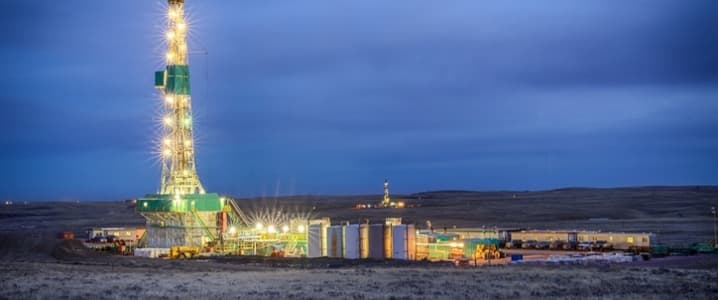Chevron sold off much of its assets in the North Sea, no longer viewing the region as a high priority.
Ithaca Energy, backed by Israel-based Delek, agreed to buy Chevron UK’s oil and gas assets in the North Sea for $2 billion, taking over interests in 10 producing oil fields, according to S&P Global Platts. Chevron UK’s holdings including stakes in the Alba, Alder, Britannia, Captain, Elgin/Franklin, Erskine, and Jade fields.
The deal in and of itself is not exactly a bombshell news event, but the motivation on Chevron’s part is notable. “Chevron has a deep portfolio of high-return tight-oil opportunities through its leading position in the Permian basin -- this sets a very high bar in the internal competition for capital within Chevron's portfolio, making regions such as the UK now look more peripheral,” oil consultancy Wood Mackenzie said on Thursday, according to S&P. WoodMac said Chevron is down to just one 19 percent stake in the Clair field, so a total exit is “looking increasingly likely.”
In April, ConocoPhillips agreed to sell its North Sea oil and gas assets to Chrysaor for $2.68 billion. It, too, is focusing increasingly on shale.
The exit of two oil majors from the North Sea in as many months highlights says a lot about both regions. Smaller oil and gas companies that hope to exploit mature oil fields in the North Sea are taking over from oil majors who longer view the paltry production figures as worth it.
Instead, the majors are looking elsewhere, which increasingly means U.S. shale. Chevron is hoping to produce as much as 900,000 bpd from the Permian by 2024, a massive ramp up that may only be outstripped by ExxonMobil, which hopes to produce 1 million barrels per day by that date. Related: Nuclear Power Dying A Slow Death
“Increasingly, super majors such as Chevron and ExxonMobil are dominating the Permian,” James Reeve, chief economist at Samba Financial Group, wrote in a recent report. “These firms have both the cash flow to ride out periods of low oil prices, and the technology to overcome issues stemming from congested well placement. Both Chevron and Exxon expect to treble their Permian output over the next five years or so.”
The Permian is at a crossroads, where smaller shale companies are finding it difficult to remain relevant. Pressure from shareholders, negative cash flow, volatile oil prices, and now the encroachment of the majors are putting the squeeze on small companies. Meanwhile, the majors, perhaps with an eye on real questions about long-term demand, have fallen in love with short-cycle projects, which they view as less risky, even if they haven’t yet proved profitable in a big way.
The majors are very confident that their bet on shale will pay off. The huge increases in production seem inevitable, even if the financials remain murky. Related: The Next LNG Boom Will Dwarf The Last One
As Liam Denning notes, Wall Street has lost patience with energy stocks. Still, some analysts view the downbeat sector as an opportunity, especially after the latest meltdown in prices. “Post the pullback [in oil prices] over the last few weeks, we remain constructive on the E&P sector,” Morgan Stanley analysts led by Martijn Rats said in a note. “[C]urrent compelling valuations present an attractive entry point in our view, while we expect increasing focus on free cash flow generation and returns across the sector to gradually help the group re-rate higher.”
The investment bank recommended buying ConocoPhillips, Noble Energy, Continental Resources and Chevron, companies that have lower costs. Moreover, in the short run, the investment bank sees oil prices moving higher due to geopolitical unrest and supply outages. Morgan Stanley sees a supply deficit as large as 1.1 million barrels per day by the third quarter, “even with weakening demand trends.”
Then, in the fourth quarter, the IMO rules on maritime fuels will also tighten up the market. But beyond the first quarter of 2020, “it becomes hard to argue that the bull case for oil will last much longer,” the bank noted.
Morgan Stanley says that deflationary forces will take hold, keeping oil prices in check over the medium-term. In that sense, the oil majors’ decisions to exit some high cost areas and put money into short-cycle projects has a certain logic.
By Nick Cunningham of Oilprice.com
More Top Reads from Oilprice.com:
- The Second Machine Age Could Crash Oil Prices
- Norwegian Oil Patch Ramps Up Spending To Counter Decline
- China's Biggest Weapon In The Trade War


















Don't kid yourself, batteries aren't going to replace oil and gas anytime soon. We would need quadrillions of them. Building that production infrastructure will take decades, and many trillions of dollars.
Mitchell's fracking work, combined with advances in horizontal drilling, changed the world as much as the invention of the Internet. Too bad only a few hundred thousand people inside the oil industry know about it.
People who think fracking is bad need to turn off their electricity, quit using internal combustion vehicles, and grow all their own food without using a tractor. Have fun with that.